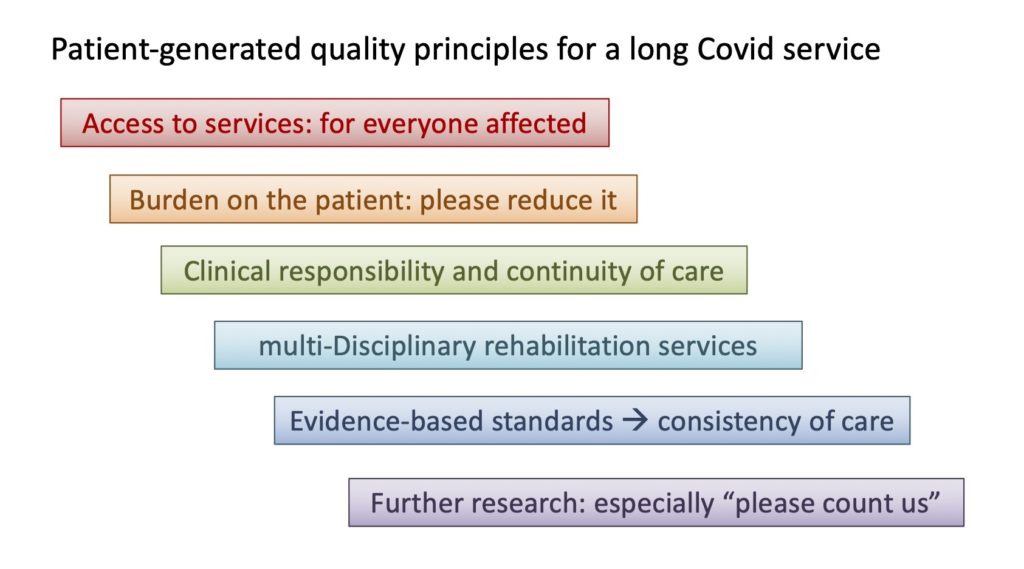
As we celebrate the significant milestone of the first person in the UK to receive an effective vaccine against Covid-19, it is easy to forget the devastation this virus has caused for so many lives. Yet, tens of thousands of people in the UK are still battling symptoms, months after their initial infection with the SARS-CoV-2 virus. Press articles and television documentaries have revealed the daily struggles of these ‘long Covid’ sufferers, but up to now, there has been little published research on the lived experience of this illness.
A new study by a team of Oxford University academics, who worked in collaboration with 114 people from across the UK with long Covid, has systematically explored the story of this novel disease and the challenges its sufferers face.
In addition to the symptoms and their effect on people’s daily lives, the research reveals significant questions about the availability and consistency of NHS care. It identifies important lessons that must be learned in order to reduce the long-term impact on individuals and their families, the healthcare system, and the wider economy.
What is long Covid?
Long Covid is the name patients gave to COVID-19 symptoms that don’t resolve within the expected 4-week time frame. The number of people who develop it is contested, since many people who had Covid-19 were not formally tested, were not admitted to hospital (or even assessed in A&E) and their continuing suffering remains undocumented.
Importantly, long Covid can affect anyone, even working-age individuals who were previously fit and well. Symptoms are diverse and confusing. Breathlessness, overwhelming fatigue, and muscle pains are common. Many people suffer problems with attention or memory, chest pains, persistent cough, blood clots, gastric reflux, tingling sensations, rashes, and other ‘surprising’ problems.
Some or all of these symptoms may be due to underlying organ damage, therefore patients should be properly assessed and receive appropriate tests where needed. However, many individuals have normal basic tests e.g. blood tests and X-rays and the underlying cause for their problems remains unknown. The causes and best treatments for many are still unclear.

What did the study team do?
Led by Professor Trish Greenhalgh, the study team recruited 114 patients with long Covid using social media. They facilitated individual interviews and focus groups where participants shared their experiences of the illness’ invasion of their lives and their encounters with the NHS and healthcare professionals.
What did the study find?
Long Covid is a serious, uncertain and confusing illness with fluctuating, sometimes severe, symptoms in every part of the body
Long Covid is a serious, uncertain and confusing illness with fluctuating, sometimes severe, symptoms in every part of the body. Many people were trapped in cycles of small improvements and crashing relapses and struggled to come to terms with the uncertainty and debilitation caused by the disease.
One participant captured the devastating impact on his personal life and occupational prospects:
‘I wasn’t able to go back to work and then I got made redundant. I can’t even imagine how I’m going to find a new job yet. In the last week […] it’s feeling possible finally, after nearly six months, that I might one day find a new job. But my life is just nothing like it was and it’s not really the life I want, you know; I need to improve.’
Long Covid sufferers found it complicated, difficult and exhausting to access NHS care
Long Covid sufferers found it complicated, difficult and exhausting to access NHS care. They experienced confusion between the GP and 111 services, difficulty with remote or online consultations, a lack of continuity, and uninformed clinicians. Patients therefore often found themselves with no choice but to manipulate or seek out their own pathways for accessing care – often private or through personal contacts.
Some long Covid patients reported care with concerning levels of quality and safety
Some long Covid patients reported care with concerning levels of quality and safety. Many had experienced encounters with ignorant or disbelieving clinicians, who dismissed their concerns. For example, a near heart-breaking account recounted how the participant was so breathless he called his GP whilst lying prone on his living room floor only to be told he didn’t sound very breathless and should take medication for anxiety. However, some participants did describe empathic, warm, caring clinicians who were supportive, and helpful, listening to their stories and sharing their distress – companions in their dreadful journeys.
Suggested quality principles for long Covid services
Channeling the anger, frustration, fear, and hopelessness expressed by participants, the study team worked closely with a small group of sufferers to identify what would make for a high quality long Covid service: the ABCDEF of long Covid.

These include Access to appropriate care that is not overly Burdensome for patients and families, with Clinical responsibility held by one clinician. An individualized, multi-Disciplinary approach should be followed using Evidence-based standards with Further development of knowledge and services in collaboration with patients.
As one of the authors described, ‘It’s been a humbling and emotional experience to work with such a committed group of patients with such powerful stories to tell. It’s sadly too late to change many of their experiences but hopefully, our suggestions could contribute to improvements for future long Covid patients.’
Comments